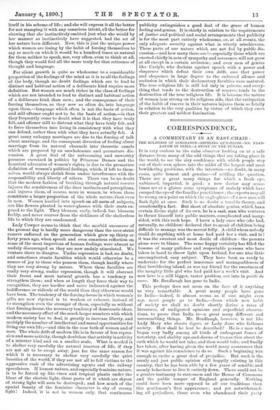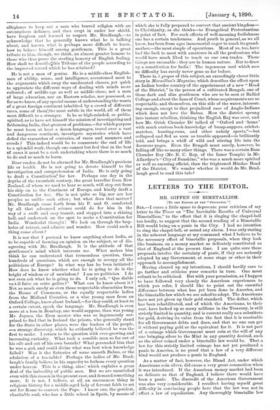CORRESPONDEN CE.
A COMMENTARY IN AN EASY-CHAIR :
THE BOLDNESS OF IGNORANCE-SETTLING QUESTIONS-MR. BRAD- LAUGH IN INDIA-A STORY OF THE PUNJAB.
IT is very curious to the calm observer looking on at a safe distance from many of the odd things that are taking place in
the world, to see the airy confidence with which people step out of their own sphere into the midst of the largest and most bewildering problems, with the intention—no doubt, in many
cases, quite honest and genuine—of settling the question. There are a great many things for which a fresh eye,
unbiassed, impartial, is good : a new doctor may some-
times see at a glance some symptoms of malady which have escaped the eye of the familiar practitioner; the experts may all be wrong on a point on which the eagle glance of a new man will flash light at once. Such is no doubt a tenable theory, and occasionally a fact. But short of absolute genius, which has a certain divine right of its own, he is a rash man who ventures to thrust himself into public matters, complicated and many- sided, with this rash hope. I knew a lady once who (she had, naturally, no children) declared that to speak of children being difficult to manage was the merest folly. A child whom nobody could do anything with at home had paid her a visit, and lo ! it was the sweetest and most docile of children : the parents alone were to blame. The same happy certainty has filled the bosoms of many guileless and respectable persons who have taken in hand to throw light upon Ireland, for one nice little uncomplicated, easy subject. They have been as ready to undertake for the perfect innocence and manageableness of that bewildering island, as was my friend for the sweetness of the naughty little girl who had paid her a week's visit. And now here is a still bigger, vaster problem cut into in gaiete de cceur. Mr. Bradlaugh has gone to India.
This perhaps does not seem on the face of it anything so very remarkable. A great many people have gone to India—indeed, it almost seems as if one might even say, most people go to India,—from which new habit of society we shall no doubt shortly derive a mass of literature, of undigested opinions and superficial observa- tions, to prove that India is—a great many different and unresembling things. Mr. Bradlaugh, however, is not like Lady Mary who shoots tigers, or Lady Jane who fathoms society. How shall he best be described ? He is a man who began very badly among all kinds of unfragrant fumes of notoriety, and shabby ups-and-downs of transaction about the oath which he would not take, and then would take, and finally has taken, after having given the world many assurances that it was against his conscience to do so. Such a beginning was enough to excite a great deal of prejudice. But such is the manly and just public opinion still happily existing in this country, that he has been able by a few years of sensible and seemly behaviour to live it entirely down. There could not be a greater testimony to statesmen and the House of Commons and the public temper of England generally. Nothing could have been more opposed to all our traditions than this gentleman's first appearance ; and yet notwithstand- ing all prejudices, those even who abandoned their party allegiance to keep out a man who braved religion with an ostentatious defiance, and then crept in under her shield, have forgiven and learned to respect Mr. Bradlaugh,—to acknowledge that he generally knows what he is talking about, and knows, what is perhaps more difficult to learn, how to behave himself among gentlemen. This is a great tribute to him, though, we think, an almost greater honour to those who thus prove the sterling honesty of English feeling. How shall we describethis Tribune of the people according to the improved record which he has attained ?
He is not a man of genius. He is a middle-class English- man of ability, sense, and intelligence, accustomed most to the arguments which sway the uneducated classes, yet quick to appreciate the different ways of dealing with minds more cultured ; of middle age as well as middle class; not a man of large education, nor an Eastern scholar, nor possessed, so far as we know, of any special means of understanding the wants of a great foreign continent inhabited by a crowd of different races, some of them:the most subtle in the world, all of them most difficult to a stranger. Is he so high-minded, so public- spirited, as to have set himself the mission of investigating and fathoming India, that greatest of problems,—for which purpose he must learn at least a dozen languages, travel over a vast and dangerous continent, investigate mysteries which have defied the researches of centuries, of races and manners and creeds P This indeed would be to consecrate the end of life to a splendid work, though one cannot but feel that in the best of cases it must be a rash undertaking where there is so much to do and so much to learn.
Dear reader, do not be alarmed for Mr. Bradlaugh's precious life or health. He is not going to devote himself to the investigation and comprehension of India. He is only going to draft a Constitution`, for her. Perhaps one day in the depths of the twentieth century, the great traveller from New
Zealand, of whom we used to hear so much, will step out from his ship on to the Continent of Europe, and kindly draft a Constitution for her. She is not quite so big, nor are her peoples so unlike each other ; but what does that matter
Mr. Bradlaugh came forth from his P. and 0. comforted by all that advanced science could do for him in the way of a swift and easy transit, and stepped into a shining hall, and undertook on the spot to make a Constitution for India. Wonderful thought ! We look on through the loop- holes of retreat, and admire and wonder. How could such a thing come about ?
It is not that I pretend to know anything about India, or to be capable of forming an opinion on the subject, or of dis- agreeing with Mr. Bradlaugh. It is the attitude of that gentleman's mind which interests me. What makes him think he can understand that tremendous question, those hundreds of questions, which are enough to occupy all the politicians of Europe? In what way has he been initiated ? How does he know whether what he is going to do is the height of wisdom or of unwisdom P I am no politician. I do not even ask what he is going to do. I only ask, " Que diable va-t-il faire en cette gal'ere ?" What can he know about it ?
Not as much surely as even those respectable obscurities from the House of Commons, or the equally respectable ladies from the Midland Counties, or a wise young man from an Oxford College, knew about Ireland,—for they could, at least to a certain extent, speak the language. Mr. Bradlaugh is even more at a loss in Bombay, one would suppose, than was young Mr. Joynes, the Eton master who was so ingenuously sur- prised to find that in Ireland the priests, who generally stand for the State in other places, were the leaders of the people, —a strange discovery, which he evidently believed he was the first to make. I return to the question with ever-growing and increasing curiosity. What took a sensible man so far out of
his role and out of his own bounds? What persuaded him that
he was a god, and could divine what was best when knowledge failed. Was it the flatteries of some smooth Baboo, or the adulation of a tea-table? Perhaps the ladies of Mr. Brad- laugh's family believe in his capacity to fathom every question under heaven. This is a thing, alas ! which explains a great deal of the imbecility of public men. But we are unsatisfied even with this reason in the present case, and demand something more. It is not, I believe, at all an uncommon thing in religious history for a middle-aged lady of fervent faith to set out for Rome to convert the Pope. I know one, the gentlest, charitable soul, who has a little school in Spain, by means of which she is fully prepared to convert that ancient kingdom— to Christianity, as she thinks—to Evangelical Protestantism in point of fact. For such efforts of well-meaning foolishness one has a certain tenderness. And youth in general, as we all know, has been from ages immemorial eager to teach its grand- mother,—the most simple of operations. Most of us, too, have had the lack to meet with amateurs in all the professions who would have much liked to teach us our own trades. These things are excusable : they are in human nature. But to draw up a constitution for India! The ingenuous soul which sees no difficulty has surely never gone so far before.
There is, apropos of this subject, an exceedingly clever little story in Macmillan's Magazine, which describes the effect upon an Indian border country of the appointment of a new " Head of the District," in the person of a cultivated Bengali, one of those dark and slim gentlemen who are to be seen at Balliol College and about the Inns of Court, whose acquirements are so respectable, and themselves, on this side of the water, interest- ing enough, except to that prejudiced race of Anglo-Indians which does not love the Baboo. How the district sprung into instant rebellion, thinking the English Raj was over, and how Mr. Grish Chunder De talked of " Oxford and `home' with much curious book-knowledge of bump-suppers, cricket- matches, hunting-runs, and other unholy sports,"—but collapsed and fled as soon as trouble appeared—is brilliantly told, and brings a whiff of wild and stirring life into the decorous pages. Even the Bengali must surely, however, be falling off like so many other things. There was a certain Ram Chunder Roy (Mr. R. C. Roy, of the Inner Temple) in Mr- Alla.rdyce's " City of Sunshine," who was a much more spirited as well as amusing official, than the frightened Hindoo Head of the District. We wonder whether it would do Mr. Brad- laugh good to read this tale ?















































 Previous page
Previous page